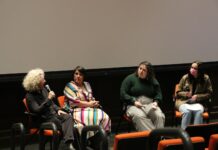Author: Juliet Suess
As ancient poets did before their time, students brought their poetry to life on stage in the second competitive poetry slam held this year at Occidental. The Cooler hosted 150 students to watch these performers challenge the likes of Homer in spoken word on Friday night. The slam was used to select the school’s top poets for the national slam team.
There were two rounds of readings, and each reading was judged on a scale of 1-10 by members of the audience. In the first round, twelve poets read their original works. Each poem gave new light into the poet’s life. There were poems about racial discrimination, love, life and friends.
After the first round, the field was cut to the six poets with the highest scores. To kick off this round, first-year Lukecus King read his poem entitled “Summer.” After the other five poets read, Occidental students Alex Stevens (senior), Maya Morales (freshman), Conor Anderson (senior) and Sarah Winters (sophomore) were chosen to represent Occidental at the national level. The four poets, as a team, will attend College Unions Poetry Slam Invitational, CUPSI, in Ann Arbor, Michigan in early April.
Stevens’s first poem described the feeling of being in a father’s house. He strolled to the stage wearing jeans and a baseball cap and stunned the audience after spitting a masterful collection of images and insights. In his poem “Houses,” he proclaims to his father that “homes can’t be built” and accuses his father of knowing but ignoring this fact.
Morales approached the stage shyly but unleashed a mind melting commentary on race that no one was expecting. Her scene began as a girl beginning a standardized test, but her poem lingered on the question of ethnicity. As a multicultural individual, the test provided her no race option.
After dwelling on the question, she filled in her own answer of “multicultural” and moved on. Morales lit the room on fire with her second poem “Jenga.” She built her metaphor for a relationship out of Jenga blocks and received two perfect scores.
Anderson came to the poetry slam after an appendectomy earlier the same day. He began his poem in the second round by defiantly announcing it as “Letters From Your Fucked Up Sons.” In the poem, the son apologized for fictional but terrible things he made his parents experience and told them that they shouldn’t have had to go through the pain of having a son like him. With this poem he earned enormous crowd approval, second place in the slam and a perfect score. The poem closes, “And you deserved a better son than this/and if it’s any consolation/it was only ever just a matter of time.”
Winters took the stage last with a poem titled “Drunk Text to God.” She questioned how the world and faith could be condensed into the weekend actions of college students. She reserved her strongest rebuke for the stereotypical jock, asking God, “If pictures are worth a thousand words, and we were created in your image, what are the other 999 words after womanizer?” For this poem, she received three perfect scores and grossed the highest point total in the slam.
Following the competition portion of the slam, guest poet Robbie Q. Telfer took the stage. He performed seven of his own poems, including some from his book “Spiking the Sucker Punch.” Telfer mentored Winters in Young Chicago Authors and when she created the Occidental Spoken Word Club. Winters realized she needed a name to draw people to the poetry slam, so she called Telfer and persuaded him to perform at the event.
Winters said, “I used to be a member of a strong [slam] community back in Chicago, but I did not find that here on campus.” That disaffection provided the impetus for the Occidental Spoken Word.
When a friend of Telfer popularized slam poetry on their college campus, he took an immediate interest. However, he often performed bizarre pieces to intentionally confuse his audience. Famously, Telfer read out of Martin Luther King Jr.’s biography until he was kicked off stage. He later decided to get serious about poetry but continued to be an oddball.
Telfer said, “It is important for the students of Oxy to know that tonight was a really important cultural event. There were 150 people in one room celebrating literature; literature that is alive. Sarah has changed the culture of Oxy. The authors tonight have created a new vocabulary about art. And that’s beautiful.”
This article has been archived, for more requests please contact us via the support system.
![]()






































